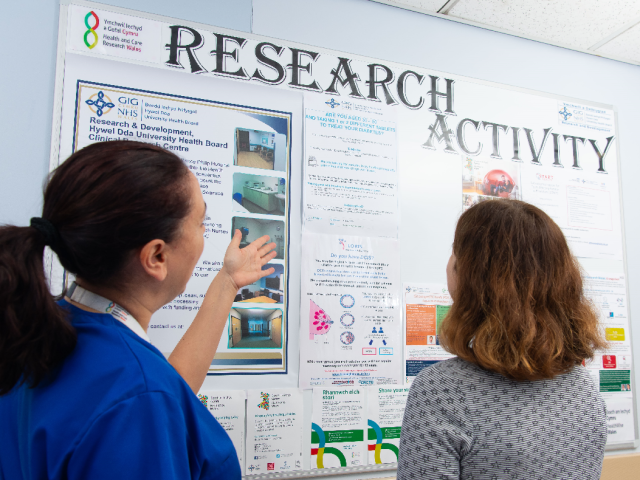
Eight ways health and social care research has made a difference in 2023
Health and social care researchers in Wales have achieved some extraordinary things this year. As we say goodbye to 2023, join us in celebrating some of the work of the research community in Wales.
Safeguarding the most vulnerable
Research by the National Centre for Population Health and Wellbeing Research has shown linking police domestic violence and health data could help reduce callouts to the police and future emergency medical admissions.
The team found emergency healthcare admissions were the most crucial factor for predicting those who will experience involvement from the police.
Futureproofing the NHS
As people get older, they are more likely to suffer from health problems like cancer, dementia and diabetes and as the number of people living with these conditions increases, so does the demand on health services.
To help Welsh Government prepare the NHS and improve services for the future, this year the Health and Care Research Wales Evidence Centre, alongside Public Health Wales, completed a review of research evidence into which long-term health conditions are predicted to increase in the next 10 years.
Watch Dr Rob Orford, Chief Scientific Advisor for Health, Welsh Government discuss this work at the Health and Care Research Wales Conference 2023.
Protecting children from criminal exploitation
As part of her Health and Care Research Wales funded research, in 2023 Dr Nina Maxwell worked with five inspiring young people to develop two films exploring the impact of child criminal exploitation.
Dr Maxwell’s study found that young people wanted to hear from those they could relate to, those who understood what it is like to grow up in Wales and to be faced with unhealthy relationships. It was from here that Nina’s idea to develop these films came to life.
The films are now available to schools by special request and aim to raise awareness of the dangers and consequences of harmful relationships.
Slowing the progression of Huntington’s disease
As part of the UniQure trial, the Brain Repair and Intracranial Neurotherapeutics (BRAIN) Unit delivered a gene therapy, which focusses on reducing the production of the Huntington protein, to three patients in Cardiff with Huntington’s disease.
This therapy could significantly slow the progression of the disease and could even provide a cure.
Supporting asylum seekers and refugees
In 2023, Dr Ashra Khanom, from Swansea University, has gathered valuable insights into NHS interpretation services available to people seeking sanctuary in Wales as part of the Health and Care Research Wales funded HEAR2 study.
Dr Khanom trained peer researchers to speak directly with asylum seekers and refugees to better understand their experience of using NHS interpretation services. She said taking part and helping with research could help sanctuary seekers become a part of their new community.
Understanding post-partum psychosis
The Mother and Mental Health (MAM) study, run by the National Centre for Mental Health, looked to understand the causes of post-partum psychosis, a mental health condition which can affect those who have given birth.
Led by, Professor Ian Jones, this research aims to help prevent the development of post-partum psychosis and improve treatment and support.
Developing researchers
This year the Health and Care Research Wales Faculty has been working hard to support their members to achieve their potential and develop their research careers through the new mentorship scheme, and to create new funding opportunities in health and social care research.
The team launched both the Researcher Development Awards and Fellowship Awards in 2023, with the fellowships offering a salary replacement doctoral award and advanced fellowship award. In January, the judging panel for the Researcher Development Awards will meet to review applications and the team look forward to welcoming successful applicants to the Faculty in 2024.
Improving skin cancer diagnosis
University of South Wales researchers have been working to develop an app that could help streamline the diagnosis of skin cancer by helping GPs more easily identify potential skin cancers.
By taking regular images of skin irregularities, GPs can then refer the patients to specialists to manage treatment earlier in the hopes of saving lives.
Keep up to date with everything happening in health and social care research in 2024 by signing up to our bulletin.